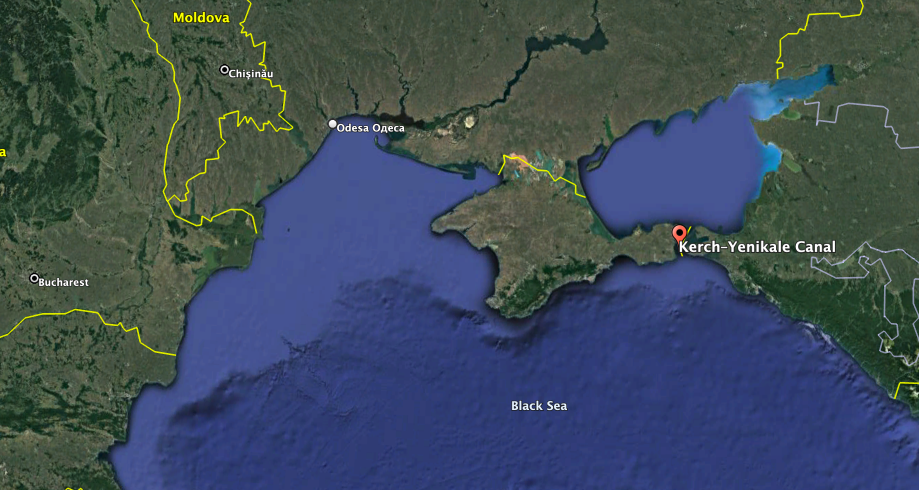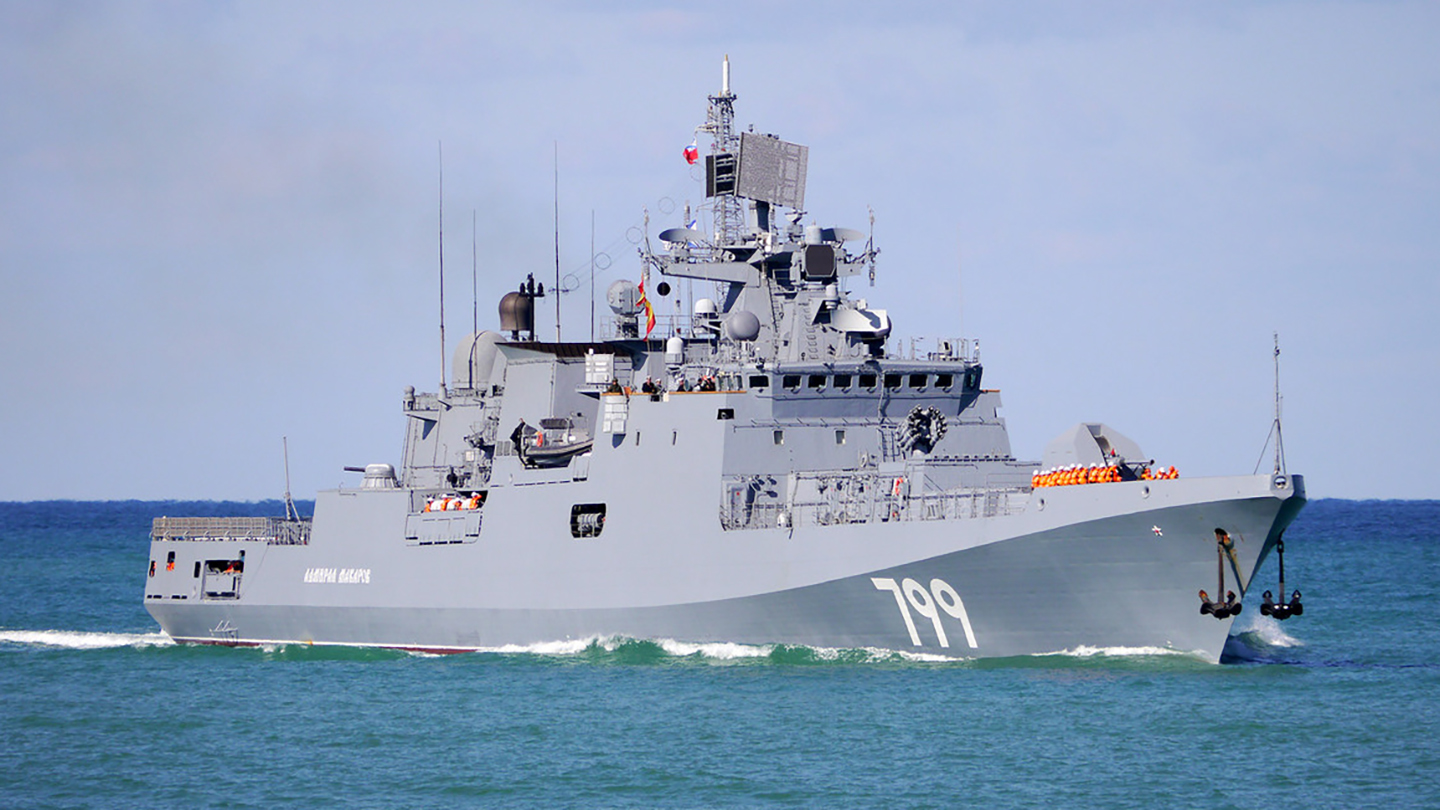A day after Russia threatened Black Sea shipping, Kyiv is now warning that all vessels in that body of water heading toward seaports in Russia or the territory it occupies “may be considered by Ukraine as carrying military goods with all the corresponding risks.”
The Ukrainian MoD also warned that “navigation in the areas of the northeastern part of the Black Sea and the Kerch-Yenikal Strait of Ukraine is prohibited as dangerous, from 5 a.m. [local time] on July 20. Relevant navigational information for mariners has already been published.”
That strait is spanned by the Kerch Bridge, Vladimir Putin’s prized $4 billion span linking Russia to the Crimean peninsula it has occupied since 2014. The bridge was attacked Sunday for the second time since October.

Emphasizing that it has the capacity to defend those waters despite not having a significant naval presence, the Ukrainian Defense Ministry (MoD) raised the specter of the Russian Navy’s Project 1164 Slava class cruiser Moskva that was sunk with a pair of domestically-developed Neptune anti-ship cruise missiles in April 2022.
“The fate of the cruiser ‘Moscow’ proves that the Defense Forces of Ukraine have the necessary means to repel Russian aggression at sea,” the Ukrainian MoD said.
The warning was delivered a day after the Russian Defense Ministry said “all vessels sailing in the waters of the Black Sea to Ukrainian ports will be regarded as potential carriers of military cargo.” It also comes as the port cities of Odesa and Mikolaiv have been subjected to a third day of airstrikes. Ukraine claims that civilians died and 60,000 tons of grain were destroyed in those attacks.
“The Russian Federation has once again brutally violated the universal right to free navigation for the whole world and is deliberately undermining food security, condemning millions of people to starvation,” the Ukrainian MoD said.
In the wake of Russia’s warning, the U.K. Defense Ministry on Thursday said that Russia’s Black Sea Fleet (BSF) “will likely now take a more active role in disrupting any trade which continues. However, BSF blockade operations will be at risk from Ukrainian uncrewed surface vessels [USVs] and coastal defense cruise missiles.”
In addition to the aforementioned sinking of the Moskva by Neptunes, Ukraine also has ground-launched Harpoon anti-ship missiles. Those missiles can reach out from Ukrainian shores to roughly 75 miles. There is the possibility that they could even be adapted for sea launch or even air launch, although there is no indications of that at this time.
Russia also claims that Ukraine has also attempted at least two very long-range uncrewed surface vessel (USV) attacks against its ships. One reportedly targeted the Project 18280 Yuriy Ivanov class intelligence ship Ivan Khurs in the Black Sea in May, about 90 miles northeast of Turkey’s Bosphorus Strait. You can read more about that in our coverage here.
The other reportedly took place in June, with Russia saying Ukraine unsuccessfully tried to attack a Russian naval ship with six high-speed drone boats as the Russian vessel Priazovye patrolled major natural gas pipelines in the Black Sea.
While it’s unclear if the attacks were real or staged, Ukraine clearly has developed a capacity to attempt increasingly advanced USV strikes. There have been several on Sevastopol, home of the BSF, and on Sunday, Ukrainian and Russian officials said the Kerch Bridge was attacked by Ukrainian USVs.
Meanwhile, overnight Thursday, Russia fired 19 missiles and 19 Iranian-made Shahed-type drones at Odesa and Mykoliav, according to the Ukrainian Air Force. Among them were seven P-800 Oniks anti-ship cruise missiles that have been converted to surface-strike weapons, four Kh-22 supersonic cruise missiles, three Kalibr sea-launched cruise missiles and five Iskander-K land-based cruise missiles.
The Ukrainian Air Force said it destroyed two Kalibrs, three Iskanders and 13 of the drones. However, the rest were able to make it through and strike targets in both cities.
The Oniks and Kh-22s in particular – along with the S-300 air defense missile being used as a surface-to-surface strike weapon – are munitions Ukraine’s air defense cannot defend against in airspace over most of the nation not protected by Patriot batteries.
In Odesa, a 21-year-old security guard was killed and several buildings were damaged during the attack, Oleh Kiper, the regional governor of Odesa, announced Thursday on his Telegram channel. One of those buildings, he said, housed Chinese officials.
“The aggressor deliberately hits the port infrastructure – administrative and residential buildings around, as well as the consulate of the People’s Republic of China, were damaged,” he said. “This suggests that the enemy does not pay attention to anything.”
In Mykoliav, one person was killed, 18 were injured and several buildings were damaged, according to the Ukrainian MoD.
The Russian Defense Ministry again said the strikes were aimed at Ukrainian military targets, including against “production workshops and storage sites for unmanned boats near Odesa and Ilyichyovsk” in that region.
Near Mykoliav, Russia said it “destroyed” fuel infrastructure facilities and ammunition depots.
Though Ukraine’s ongoing counteroffensive in Zaporizhia Oblast and the Donbas has rightly garnered a lot of global attention, the situation in the Black Sea has gotten significantly more volatile with the bridge attack and Russia’s subsequent withdrawal from Black Sea Grain Initiative. That deal was hammered out last year to allow grain and other food and fertilizer to be shipped out via Ukraine’s Black Sea ports of Odesa, Chornomorsk and Yuzhny.
The ending of that deal has already created global issues, with rising what prices among them, the Pentagon noted Thursday.
In addition to continuing its attacks on Ukrainian ports on Thursday, a White House official warned that Russia was also mining Ukraine’s the approaches to Ukrainian ports and appeared to be laying the groundwork for attacks on civilian vessels.
“We believe that this is a coordinated effort to justify any attacks against civilian ships in the Black Sea and lay blame on Ukraine for these attacks,” the official, Adam Hodge, a spokesman for the National Security Council, said in a statement, The New York Times reported.
We will pay close attention to developments there and update this story when warranted.
Contact the author: howard@thewarzone.com
